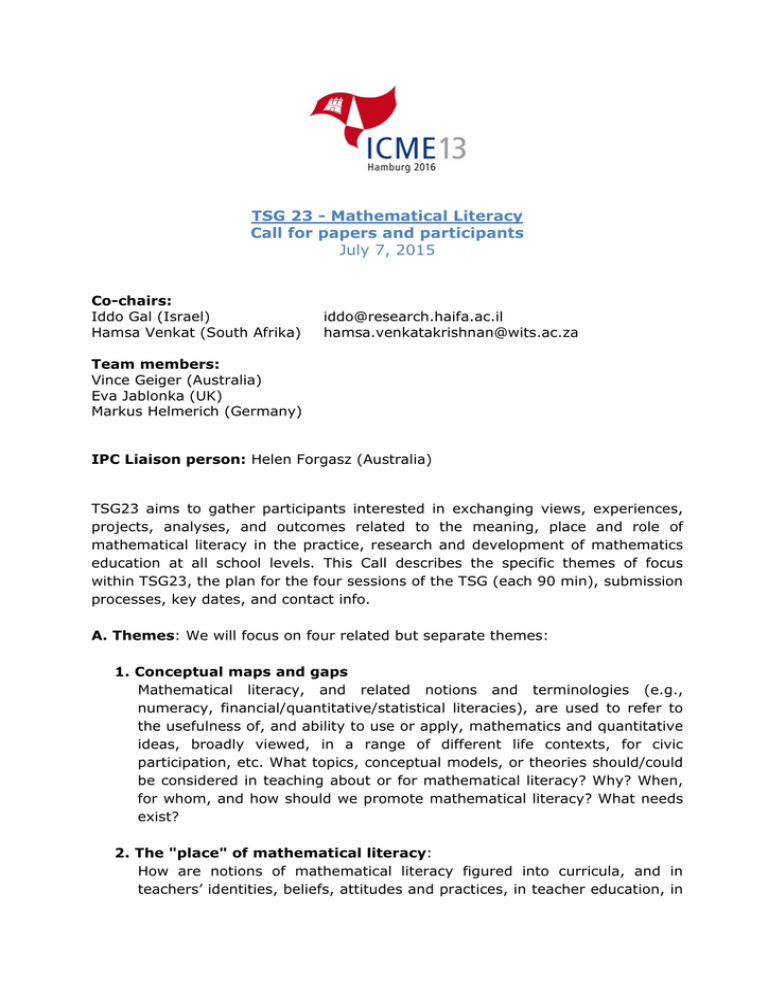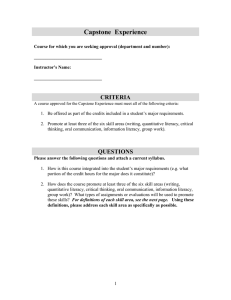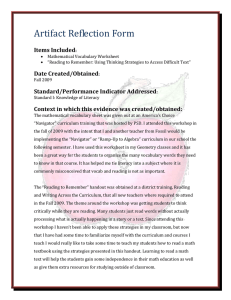TSG 23 - Mathematical Literacy Call for papers and participants
advertisement

TSG 23 - Mathematical Literacy Call for papers and participants July 7, 2015 Co-chairs: Iddo Gal (Israel) Hamsa Venkat (South Afrika) iddo@research.haifa.ac.il hamsa.venkatakrishnan@wits.ac.za Team members: Vince Geiger (Australia) Eva Jablonka (UK) Markus Helmerich (Germany) IPC Liaison person: Helen Forgasz (Australia) TSG23 aims to gather participants interested in exchanging views, experiences, projects, analyses, and outcomes related to the meaning, place and role of mathematical literacy in the practice, research and development of mathematics education at all school levels. This Call describes the specific themes of focus within TSG23, the plan for the four sessions of the TSG (each 90 min), submission processes, key dates, and contact info. A. Themes: We will focus on four related but separate themes: 1. Conceptual maps and gaps Mathematical literacy, and related notions and terminologies (e.g., numeracy, financial/quantitative/statistical literacies), are used to refer to the usefulness of, and ability to use or apply, mathematics and quantitative ideas, broadly viewed, in a range of different life contexts, for civic participation, etc. What topics, conceptual models, or theories should/could be considered in teaching about or for mathematical literacy? Why? When, for whom, and how should we promote mathematical literacy? What needs exist? 2. The "place" of mathematical literacy: How are notions of mathematical literacy figured into curricula, and in teachers’ identities, beliefs, attitudes and practices, in teacher education, in learning materials, in local/national assessments, etc. What tensions and challenges emerge? What dis/continuities exist between teaching of mathematical literacy in school and in tertiary and adult contexts? 3. What can large- and small-scale studies tell us about mathematical literacy? What do empirical results from studies with differing scales and foci (e.g., on skill transfer, literacy/language aspects of applied mathematical tasks, teachers, inter/national assessments) indicate that can inform our thinking about the conceptualization, teaching, learning, or assessment of mathematical literacy? Given such results, should mathematical literacy be directly taught, or be integrated across curriculum subjects, and how? Or can it emerge as a by-product of teaching "regular" mathematics? What evidence do we have about possible (re)solutions? 4. A view to the future of mathematical literacy If we are committed to developing mathematical literacy at the school level, what barriers should we overcome? What new types of initiatives, policies, or collaborations (across subject areas, outside schools) are needed? What are potential gains/losses with possible initiatives? B. Session plan. TSG23 aims to promote a scholarly dialogue and advance knowledge about the four related themes listed above. Session 1 will open with a Plenary talk & Discussant that will examine the conceptualization of mathematical literacy, aiming to provide a "big picture" overview of the state of the art and dilemmas and some findings in this regard. Session 2 will likewise include a Plenary talk & Discussant on the linkage between assessments and policy related to mathematical literacy. Session 3 will involve two parallel tracks (sub-sessions), each with 3-4 talks of 12-14 minutes each. All speakers are asked to present findings and ideas that can inform the group's discussions related to selected aspects of themes 1 to 3, but that can also help our joint thinking about theme 4. Presentations will be kept short, to leave ample time for general discussion. Finally, Session 4 will focus on the last theme, i.e., "A view to the future of mathematical literacy", and will involve a Panel discussion with members of the TSG23 lead team and invited guests, followed by a general discussion by all participants, and closing remarks by the TSG23 lead team. C. Submission guidelines We invite you to submit a paper or poster related to the goals of TSG23 and focused on one or more of the four themes outlined earlier. We follow all submission principles announced by the ICME13 Scientific Committee - see 2nd Announcement, pages 31-32. Below are highlights and additions that may help you to plan your submission to TSG23. First, note that this TSG23 focuses on four broad themes described above pertaining to Mathematical Literacy (broadly viewed) at all school levels. As in any ICME, there are other TSGs on related but separate areas, e.g., TSG6 ("Adult learning of mathematics"), TSG3 ("Mathematics education in and for work"), and TSG14 and TSG15 on teaching and learning of Probability and of Statistics. However, the ICME13 rule is that you can submit a paper to only one TSG, and participants are encouraged to attend all four sessions of the same TSG. (If you are in doubt as to which TSG to submit to, we advise that you first read all descriptions of relevant TSGs, then choose based on the core messages of your paper, and the types of discussions you want to participate in and contribute to). As you know from the general submission guidelines, you can submit only one paper as a presenting author (up to 4 pages total length) or one poster (1 page description, not the actual poster). All submissions will be peer-reviewed. The TSG23 team will select 6-8 papers for presentation in the TSG23 sessions (most likely in the two tracks of session 3), depending on their quality and alignment with the planned structure of TSG23 (Authors of these papers will be invited to expand their contribution to 8 pages). Following the review, all other papers submitted to TSG23 will be directed for presentation in "Oral Communication sessions" attached to each TSG. Posters will likewise be presented in evening sessions attached to the TSG. In selecting papers for presentation within TSG23 itself, we will give preference to papers that aim broadly at one or more of our four themes. We encourage you to not just present outcomes (of a study, project, conceptual analyses or literature review), but also close your submission with a welldeveloped Discussion section that clarifies the contribution of the paper to some of the questions outlined in this Call under the four themes of TSG23, and/or how your work informs a discussion of or can help thinking about solutions or future steps in this regard. (Your talk, as well, will have to be brief and focus on selected key messages in this regard). Technicalities and Deadlines: Please see 2nd Announcement, especially pp. 31-32, regarding the submission process via Conftool, the use of ICME-13 website for accessing TSG23-related papers and materials for discussion, etc. Please note all deadlines and dates (Last day for submission: Oct 1, 2015). We look forward to getting your submission and to your active participation in our group discussions. For all technical questions on dates, funding assistance, submission processes, etc., please contact the ICME-13 Secretariat as explained in the 2nd Announcement or on the ICME-13 website. If you have questions on the content of our TSG23, please do write to us directly at one of the Emails above.



